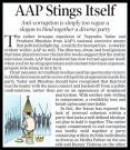High drama in the AAP
The tumult in the Aam Aadmi Party dominated the editorial pages.
DARIUS NAKHOONWALA dissects their analysis. Pix: ToI edit on March 30.

You don’t say!
Darius Nakhoonwala
An amazing this has happened, folks: the Indian Express has virtually stopped writing edits on politics. If you check it out here you will see hardly any on politics during the past 10 days or so.
I happened on this little fact while looking for its edit on the current upheavals in the Aam Aadmi Party (AAP) in which Arvind Kejriwal now rules supreme. Wonder what the new policy at the Express is.
Is it based on a formulation that the Times of India reached at least a decade ago, that the ‘new’ reader doesn’t care a fig about politics? This diagnosis is probably true but surely you can’t drop to almost zero edits on politics, can you?
Others are not treading this path which has been less travelled by. All the biggies had a go at the AAP, even the Telegraph which usually wakes up a few days late. I really didn’t expect it to comment on what is, in the end, a regional Delhi-based party.
As might be expected of the two major Delhi papers, there was much hand-wringing over the AAP. The Hindustan Times moaned, glumly, that “the citizens of Delhi can only be sad at the internal happenings in the AAP over the weekend.” Sad? Furious, is what I would have thought. “…the party did not, and still does not, have a hierarchical structure, which it cited as proof of its internal democracy…it faces a serious question: Whether all its virtues will blow up in its own face.” Haven’t they already?
The Times of India made the most obvious point: “The AAP break-up also reflects what the party has in common with almost every other party in the country: they are one man or one family shows. There is little space for dissent or alternate viewpoints...the personality cult around Kejriwal is now both a strength and a weakness of AAP.”
The Pioneer gloated. “It is understandable for a political party that has suffered a debilitating electoral defeat to witness internal wrangling and even a split. It is rare for a party which has won a resounding mandate to implode within months of the success…it is clear that the Aam Aadmi Party will no longer be what it had set out to be — a different political entity with strong roots in participative democracy and disdain for the ‘high command' or ‘central command' culture.”
The Telegraph wrote good angrezi. “Whoever said one can never have too much of a good thing was charmingly naïve. Volunteers of the Aam Aadmi Party would find such a belief dubious...the spectacle offered by the AAP is almost innocent, maybe because it is somewhat like a high-minded grouping with moral ideals trying to evolve into a political party.”
The Hindu said the current troubles “at the top levels of the leadership present an existential threat…instead of the AAP changing the political system, the political system seems to be assimilating the AAP…Mr. Kejriwal seems to be opting for a highly personalised style of leadership and campaign, and looks more interested in quick-fix solutions that do not always allow for the complexities of the problem.”
The Business Standard said, after a preamble that was too long, that the AAP “has lost the moral high ground it occupied after its unprecedented sweep of the Delhi Assembly elections just a short time ago…
The underlying reasons for the party's internal tumult are many. One is the fundamental push in Indian politics, as it now stands, towards one-individual political forces. When the AAP asked for votes in Delhi, it did so in the name of Arvind Kejriwal…He has shown himself to be cast in the same mould as other powerful chief ministers -- whether Nitish Kumar or Naveen Patnaik or Jayalalithaa or Mamata Banerjee.
The Economic Times put it very pithily: “Aam Aadmi Party, the experiment, is dead. AAP, the political party that was born out of the experiment, is alive and kicking.”
Need anything more be said?
Such articles are only possible because of your support. Help the Hoot. The Hoot is an independent initiative of the Media Foundation and requires funds for independent media monitoring. Please support us. Every rupee helps.
Subscribe To The Newsletter






